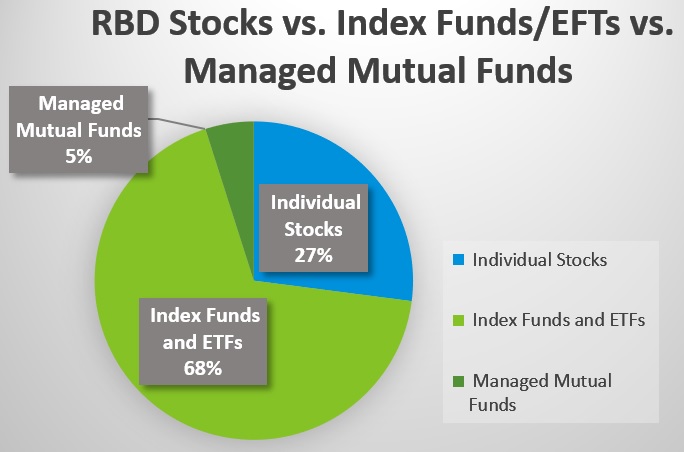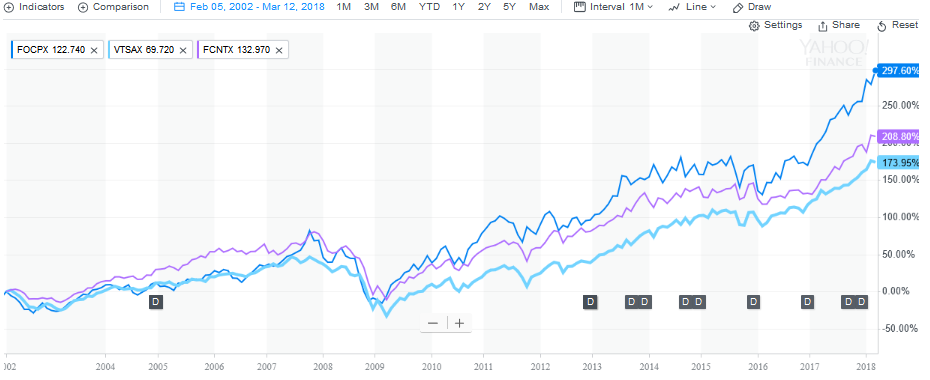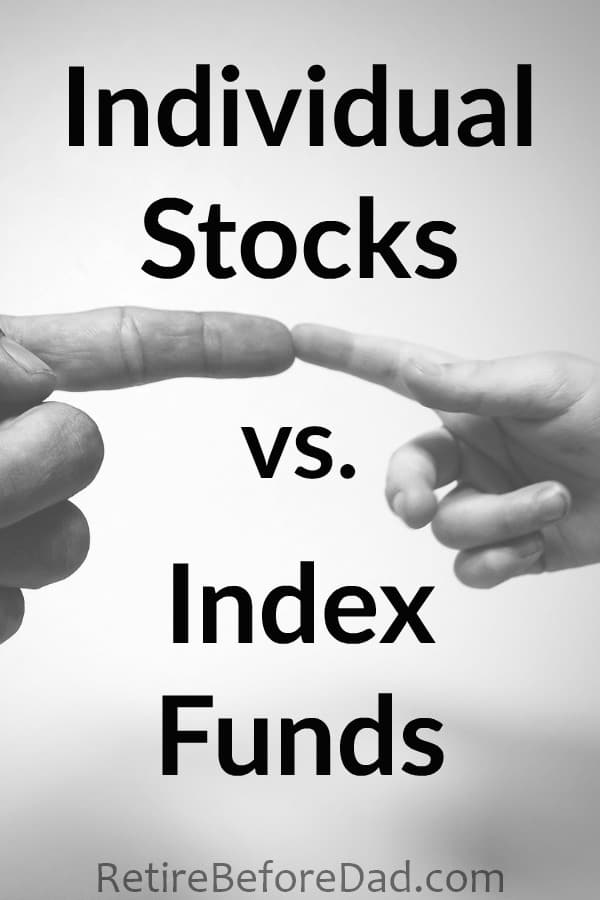Individual Stocks vs. Index Funds – Why I Choose Both
 I’ve never joined the debate about individual stocks vs. index funds because I’ve never chosen one side or another. I invest in dividend growth stocks, index funds, and even a few growth stocks and managed mutual funds.
I’ve never joined the debate about individual stocks vs. index funds because I’ve never chosen one side or another. I invest in dividend growth stocks, index funds, and even a few growth stocks and managed mutual funds.
I’ve invested in individual stocks since 1995. That year, my uncle gifted me one share of Chevron stock and I’ve owned it ever since. I now own about 50 individual stocks in my taxable portfolio.
I buy individual stocks to build investment income via the dividend growth investing strategy. When I buy dividend stocks, I look for high-quality companies that have a long history of paying and increasing dividends. Here’s a list of 56 stocks that fit that mold.
Unlike market fluctuations, dividend income is predictable. I like predictable, stable income streams. That’s what has attracted me to dividend growth for more than two decades.
However, it requires picking stocks, and picking stocks is often frowned upon by many influential pundits and personal finance bloggers who recommend strictly investing in low-cost index funds. That’s because most people can’t pick stocks and beat the market indexes over extended time periods.
Most equity mutual fund managers can’t beat the market indexes either. So why bother trying?
The answer is that dividend growth investing is not about trying to beat the market, it’s about creating a reliable income stream. Done right, and the income will grow each year at a rate faster than inflation.
That said, many dividend growth investors argue the strategy is superior over the long-term with proper time devoted to stock research. Pure indexers say dividend growth is a loser’s game and also proclaim supremacy.
Others say growth stocks are the best bet for beating the market. All parties can fervently defend their strategies and back up their arguments. But the best strategy for you is what you’re comfortable with.
Closet Indexer
The specific numbers I share in my portfolio and each quarter are only for my taxable accounts and my favorite online broker, M1 Finance. But we also have quite a few retirement accounts.
I max out what is allowed every year. I’ve never fully shared the contents of my retirement accounts except for a few mentions here and there. Because they are boring, and I don’t want to confuse you with six accounts and more fund symbols.
These accounts mostly hold equity index funds and ETFs, but also a few individual stocks and a couple managed mutual funds.
Out of curiosity, I analyzed all of the equity holdings from my taxable portfolio, a Vanguard IRA, two Fidelity Roth IRAs, and two Fidelity Traditional IRAs (one each for Mrs. RBD and I), to determine the allocation of individual stocks vs. index funds or ETFs vs. managed mutual funds.
Here’s what I found:

68% of my total equity holdings are in index funds and ETFs. So you see, I’m a closet indexer! OK, not really. I’ve mentioned my preference for index funds in retirement accounts before.
But index funds were not always the majority. For many years I had to settle for a much higher percentage of managed mutual funds because of my previous employer’s terrible 401(k) plan. After 14 years, the balance was large despite the lousy funds. But I’ve since switched the old account to Vanguard and the funds are now indexed.
The Fidelity IRAs are mostly invested in index ETFs such as IWM, VOO or VTI, plus a few total market funds similar to my new 403(b) and a few growth stocks.
In addition, I continue to own two managed mutual funds that are long-term staples tracing back to at least February 4th, 2002, according to the oldest tax lots I can view (I believe I’ve actually owned them since I started my career in 1998).
The two managed funds are the Fidelity Contrafund (FCNTX) and the Fidelity OTC Fund (FOCPX). Both of these funds, to my surprise, have beaten the Vanguard Total Market Index (VTSAX) since February 2002, according to Yahoo Finance.
That’s not to say investing in managed mutual funds is better. About 80% of managed mutual funds don’t beat their targeted index. I got lucky with these two. Since they’ve outperformed, I’ve never bothered reallocating to index funds.

Source: Yahoo Finance
Reasons to Buy Individual Stocks vs. Index Funds
OK, back to the original premise of the article.
As you see above, I’m pro index fund. So if you’re all in there, that’s great. The case for only investing in index funds and ETFs is very strong.
The beauty of index investing is it requires very little research. Simply choose a few low-cost index funds with broad holdings and continually invest in them for the long-term. Ride out the market fluctuations and don’t sell when it declines.
The low-cost nature and ease of investing in them are certainly driving new cash to Vanguard and Blackrock (iShares), now the two largest U.S. money managers.
But investing in individual stocks still has its advantages too. You’ll need to learn how to research stocks first, but there are a number of reasons why it’s worth buying individual stocks. Here are a few:
Create a Portfolio of Reliable Income
This is why I buy individual stocks. Owning dividend growth stocks is a way to build a predictable and sustainable income stream that is mostly passive after the initial research.
Choose stocks that historically pay and grow their dividends to earn income that increases greater than the rate of inflation. The key is to buy companies that are well-managed, have a competitive advantage, and are immune to economic cycles.
Index funds pay dividends too, but the yields are low and payment amounts are inconsistent. Some low-cost funds and ETFs focus on dividend-paying companies, but they don’t offer the broad range of stocks that makes index funds appealing.
Own Only the Companies you Like
Two popular dividend growth stocks that I have never owned are McDonald’s (MCD) and Walmart (WMT). I don’t own them because I prefer to eat and shop elsewhere.
I’ll go to Target (TGT) or Costco (COST) any day over Walmart. I figure if I don’t like the shopping experience, I should not own the stock (though I do own them indirectly through funds).
By investing in stocks individually, you can choose the companies you like or don’t like. This perfect for people who are loyal to a certain brand or invest based on their personal values (environment, religion etc.).
Be careful of bias. You may love shopping at Sears (SHLD) but the stock is lousy.
Don’t Own the Companies you Don’t Like
Total U.S. market index funds own stock in all the publicly traded companies in the U.S. That includes the so-called vice stocks such as cigarettes, gambling, alcohol, and firearms stocks.
If you buy your stocks individually, you can avoid the companies you don’t want to support.
This topic has recently come to light in the aftermath of the school shooting in Florida. Some investors don’t want to own firearms stocks.
Potential to Outperform the Market
When you invest only in index funds, you will underperform the markets by the expense ratio on your funds plus any transaction fees you might pay. For most investors, that is a very acceptable return.
But, if you plow all your money into index funds, you leave nothing for speculation. I’m an advocate for using a small percentage of your portfolio for speculation. 5%-10% max.
Speculative investments can be invested in growth stocks, options contracts, crypto-currencies, a business, or whatever floats your boat. By taking bigger risks, you give yourself the potential to outperform, something you are guaranteed to not get from indexing.
Young people, in particular, can afford to lose and may benefit from making a risky investment. This is especially worthwhile if you have some kind advantage, such as a background in certain profession or discipline that would make you privy to industry trends or a particular growing technology.
Slightly Lower Cost
Depending on how you assemble your portfolios, you can save money on fees through individual stock investing. When you buy an individual stock through a low-cost broker such as Ally Invest, you’ll pay a one-time trading fee of about $5 regardless of how many shares you buy. Once you own the stock, it’s yours. There are no further costs (aside from taxes on dividends if not in a tax-advantaged account) until you sell.
If you use a no-fee broker such as M1 Finance, it’s free to acquire shares.
Index funds and ETFs, on the other hand, carry a recurring annual fee known as the expense ratio. The lowest cost funds have an expense ratio of around 0.05%. If you put $10,000 in the fund, the annual fee taken out will be about $5. As the fund value increases so do the fees. You also may pay trading fees if you buy an index fund or ETF through an account that doesn’t provide free trades. Dividends are treated the same as stocks.
We’re talking small amounts here for beginners, so it’s not a major ding on indexing. But low fees is one of the main arguments for index funds and buying individual stocks is actually cheaper, especially as the numbers grow.
Arguments Against Buying Individual Stocks
Yes, there are quite a few arguments against buying individual stocks. I’ll start with the obvious.
You are Unlikely to Beat the Market
It’s not impossible to beat the market as an individual investor. But it takes some skill and some luck. The amount of time required to spend on research to beat the market year after year would probably detract from the quality of your life.
That doesn’t mean you can’t try to pick a winning growth stock through speculation. Just keep your expectations low. You probably won’t win over the long-term unless you pick one or two big winners and hold them for many years.
Emotional Bias
Emotions are the weakness of investors. Investing in stocks is the perfect forum for emotional bias. I like shopping at Costco and the one near me is busy all the time. Should that mean I buy the stock too? For me, it did play a part in my decision. I enjoy shopping there, but I did the research too.
Understanding bias and constantly playing devil’s advocate against yourself is crucial for investing in individual stocks. It can be tiresome.
Sometimes bias it’s impossible to avoid because it’s subliminal. A pure index fund strategy through thick and thin avoids any ill-placed bias that could be detrimental to your returns.
Higher Risk
Since there’s no way you’ll individually own as many stocks that are in a broad total market index fund, your individual stock portfolio is at greater risk of declines. Severe declines due to a bankruptcy, a Lehman Brothers-style catastrophe, or something unknown today would have a greater impact on your portfolio as a percentage of total portfolio compared to a broad index fund.
Not Good at Picking Stocks
If you have no experience and haven’t read any books on investing in stocks, you won’t choose good stocks. Following the advice of an adviser could help you but your fees will increase dramatically. Alternatively, you can heed the advice of TV personalities or subscribe to a stock newsletter, but if you don’t know what you’re doing, it will eventually catch up to you.
Don’t Have the Time
Simply put, if you don’t have the time to research and select stocks, don’t invest in individual stocks. Without research, you will not perform well. Go with index funds instead.
Taxes on Dividends
Index funds, ETFs, and some individual stocks all pay dividends. When paid a dividend, that money is taxed. Most dividends are qualified, which means they are taxed at the long-term capital gains rate which is 15% for most people. Plus state tax.
If you’re allergic to taxes, use a traditional IRA or Roth for your dividend investing. Or, only buy non-dividend paying stocks in a taxable account. For tax efficiency, ETFs are a better option in a taxable account than index mutual funds because they are required to pay out fewer capital gains.
Even if You can Beat the Market, it may not be Worth the Time and Risk
The S&P 500 was up 19% in 2017. If you spent countless hours researching stocks and your returns beat the market by 2%, was the time worth it? If you are going for total return, trying to squeak out an extra percent or two may take up a lot of your time that could be better spent enjoying yourself.
Conclusion – Individual Stocks vs. Index Funds
This blog started primarily as a stock investing website. Now I write more about broader investing and personal finance themes. I enjoy writing about these topics more than stock analysis, and they appeal to a wider audience bringing more readers to RBD.
Mutual funds have been at the core of my retirement savings since I started my career in 1998, even though I don’t track them on my blog. Since leaving my job of 14 years, I now have a much better selection of funds to invest in, and 68% of my stock holdings are now in index funds.
But individual stocks will always be a part of my strategy because they are an efficient way build investment income. Even after surviving two massive stock market declines, I’m still very comfortable with this strategy.
The last nine years of market returns have been awesome, and thus, most investors have experienced great success regardless of experience. When market uncertainty hits, most dividends will continue to be paid, even when the index funds decline 30%-40%.
Some companies may find themselves naked in the low tide, but a diversified portfolio of dividend growth stocks will survive. And so will the index funds.
What’s your opinion on individual stocks vs. index funds? Does anyone else invest in both?

Photo credit: PublicDomainPictures via Pixabay
Disclosure: Long CVX, COST, TGT, SPY, VTI, IWM, VTSAX, FOCPX, FCNTX

Craig is a former IT professional who left his 19-year career to be a full-time finance writer. A DIY investor since 1995, he started Retire Before Dad in 2013 as a creative outlet to share his investment portfolios. Craig studied Finance at Michigan State University and lives in Northern Virginia with his wife and three children. Read more.
Favorite tools and investment services right now:
Sure Dividend — A reliable stock newsletter for DIY retirement investors. (review)
Fundrise — Simple real estate and venture capital investing for as little as $10. (review)
NewRetirement — Spreadsheets are insufficient. Get serious about planning for retirement. (review)
M1 Finance — A top online broker for long-term investors and dividend reinvestment. (review)

I’ve had an interest in dividend stocks for a while now, but haven’t taken any action on it yet. Index funds are obviously easy if you don’t want to invest any time into research. Hopefully one of these days I’ll take the plunge. Thanks for sharing the list of 53 stocks
That is the Dividend Aristocrats list I linked to which is considered the cream of the crop. Though it excludes plenty of worthy investments due to the rules. I meant to update the data last night but forgot! Index funds are a great way to get started investing for how simple it is.
Yes, I invest in both, but mostly in index funds. Our retirement accounts (almost half of our net worth) are in mutual funds: 85% with Vanguard and 15% in actively managed funds. But I keep two brokerage accounts: one with Vanguard (ETF’s) and another with Robinhood, where I invest in stocks. I like Robinhood’s platform, no cost for basic trades. It’s less than 5% of our net worth, and I mainly use the Dividend Aristocrats or Dogs of Dow as my basis for picking stocks.
Nice. Yeah, Robinhood is cheap and legit. I haven’t tried it yet because I’m happy with my other brokers. Sounds like we have a similar strategy.
Whole heartedly agree with your combination approach! Buying individuals stocks isn’t for everybody, but those who take the time to do so correctly can earn market-beating returns over the long-term.
I know you’re probably more into growth stocks rather than dividend stocks knowing your background. I’ve never had much success with growth stocks, though I’ve never been a subscriber 🙂
Great stuff, that’s why we invest in index ETFS, dividend stocks, and occasional growth stocks. The last one is more speculative so we limit our exposure.
The entirety of my retirement accounts are fully invested in VFIAX and VINIX, and I also have a taxable brokerage account that is mostly individual stocks. I do have a small portion in SPHD as well. Keeps things interesting and I love seeing the dividends roll in every month!
Thanks for sharing your holdings. Good stuff.
Why do most people buy stocks?
Most people buy stock because they hope it will go up and they can sell it for a profit. Is HOPE an investment strategy? Dividends are much more stable and likely to happen than hoping for capital gains.
So I have both. Individual dividend paying stocks, and mutual funds… most funds are indexed.
Sounds like a similar train of thought. I still like buying low and selling high, but that kind of investing is based more on growth rates and trends rather than income.
-RBD
High quality dividend stocks are also generally, less volatile. I use that strategy as well and overlay covered call option sales to juice returns. Sometimes a good stock gets called away, but there are plenty of good dividend candidates out there. Just takes some time on Morningstar to keep my list current.
Oldster,
I used to do more covered calls a while back, but I find options to be exhausting. So much more research to find the right one. Then watching them along with other investments. They consumed my time.
-RBD
Great article. I also do indexing and I hold a portfolio with close to 30 high-quality dividend stocks. I’m happy if I get 2-4% in dividend return and 4-8% earnings per share growth. That’s good enough for me and I don’t need to speculate if a company caaaan earn money one day. And the time argument is a common one, but stocks are fun, it’s a hobby and most hobbies aren’t cheap. Actually, stocks might be one of the few hobbies you will spend a lot of time on and actually come out in +++
I guess I consider it a hobby too. I do follow quite a few companies and it is fun. Much better than baseball cards!
RBD –
I dig it and yep – my 401k are index funds, but personal – individual dividend stocks all day, every day. You have more control of the income and like you said – owning stocks you like/don’t like, etc.. I am pro-dividend stocks! Biased? Maybe… haha
-Lanny
You guys biased toward dividends? Who would of thunk it!
Despite considering myself very financially savvy and enjoying stock research, I eventually faced the truth that I was picking no better than index funds. Sure I would pick one or two winners, but then I’d also have one or two losers. I keep most of my retirement (and non-retirement) in index type funds. I do keep a little (maybe 10%) in individual stock as “mad money” – it is fun to play individual stocks. Personally being on the young sider of my investment timeline (late 20’s), I try to play more index funds or growth funds instead of just dividend stocks.
Big shout out to the Contrafund – I’ve been in that fund for a number of years and have been pleased.
I can’t bring myself to sell Contrafund and OTC. Both have been solid for so long, it doesn’t make sense to sell. I supposed if Will Danoff leaves it may be time to let go.
One question that I often ask myself is, “do I consistently need to beat the market in order to justify buying individual stocks?” Like you, a lot of my savings sits in mutual funds and ETFs, although I’ve recently started buying some individual dividend paying stocks. With the overall market soaring to new heights last year and into this year, I saw my returns fall below “the market”, when compared to a basic S+P fund.
Part of this can be attributed to what I chose to purchase as everything kept going up and up and up. I bought more consumer defensive type stocks. Anticipating some eventual decline, I put a few bucks into bonds, and even a few bucks less into gold. I chose to sacrifice some growth now for hopefully less of a decline later.
Like others have said, I view stock picking as a hobby, so it’s worth the time and energy I put into for that reason. It’s fun and I enjoy it. I’m not an expert, but I’ve enjoyed reading, learning, and getting better. Am I costing myself a few percentage points of growth over just putting everything into index funds? Maybe, probably, hard to say as I haven’t been doing this long enough to really have an accurate picture of that. If my savings keeps up with the rough timeline I’ve laid out for myself, then I’ll remain satisfied with my methods. If it means putting off retirement a few months down the road because I cost myself a few bucks along the way, then I can live with that.
We have index funds and individual stocks. I like individual stocks for the same reason as you. You can pick and choose the company that will generate good income. When you buy index fund, you get companies you don’t like mixed in. That’s okay in retirement account because we focus on accumulating.
In our taxable account, I focus more on income. It works for dividend growth stocks.
Hey RBD,
Dividend stocks all the way.
I only wish I had started in 1995 like you!
A lot of my stocks are UK companies. We don’t have the same number of dividend aristocrats to choose from as you do in the States. Nothing like it, in fact.
But, in general the yields are higher.
As you say, it’s about building an income stream. Capital appreciation is nice, but not the most important thing.
Just keep reinvesting the divs!
Individual stocks allow for the investor to take additional risk and potentially higher reward compared to investing in the entire universe of equities.
I think it’s better to buy sector ETFs or index funds like $SPY. It’s really hard to know which companies will underperform or outperform.